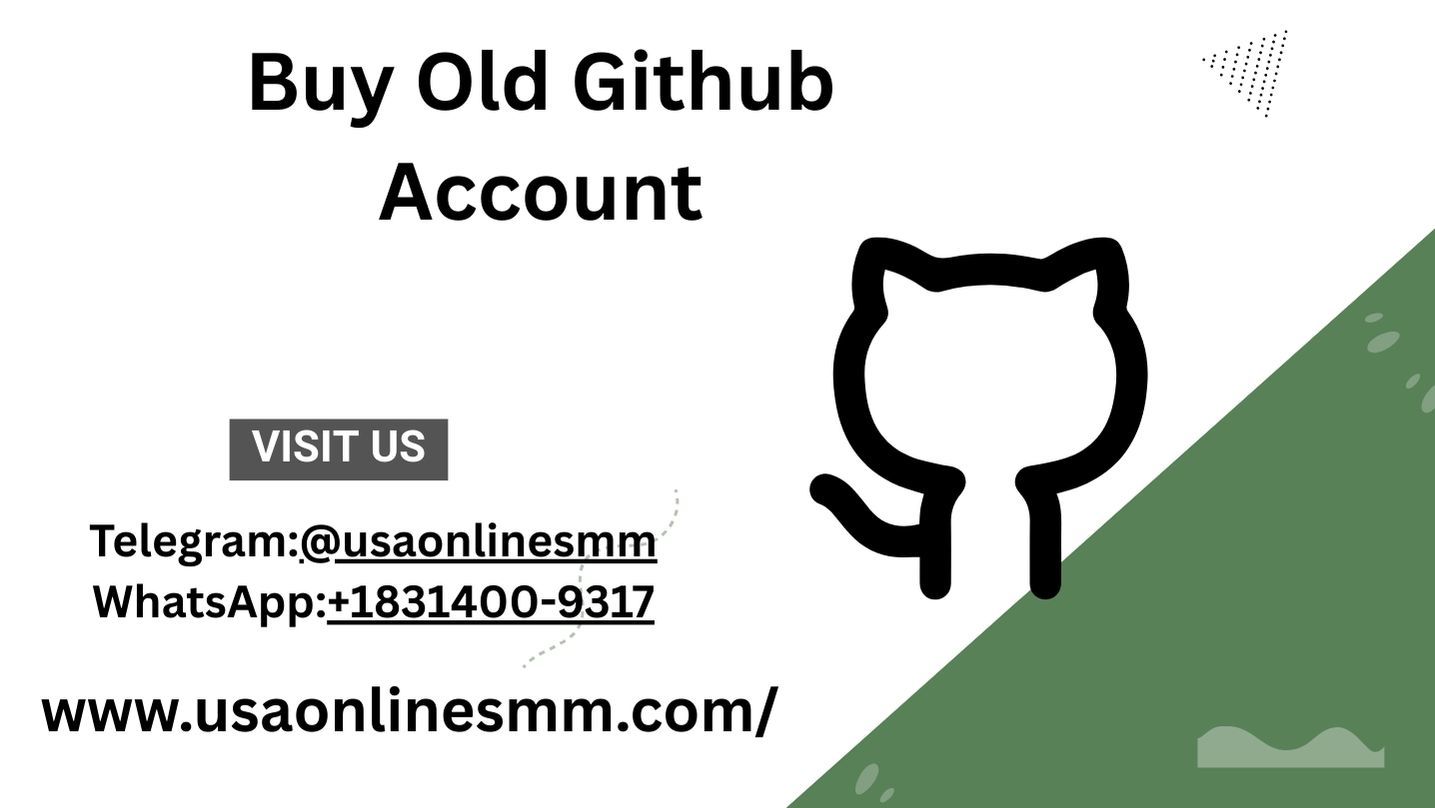Buy Old Github Account
In the world of software development and technology, having an established online presence can make a significant difference in credibility and opportunities. GitHub has become a central platform for developers, open-source contributors, and technology enthusiasts alike. While creating a new GitHub account is straightforward, acquiring an old GitHub account can offer strategic advantages. Understanding the benefits, risks, and procedures associated with buying old GitHub accounts can empower developers, businesses, and tech professionals to make informed decisions.
If you want to more information just knock us 24-hour reply
Telegram:@usaonlinesmm
WhatsApp:+1831400-9317
Advantages of Buying an Old Github Account
One of the primary reasons individuals and businesses consider buying an old GitHub account is the credibility that comes with a long-standing account. Accounts that have existed for several years, particularly those with active repositories and a history of contributions, signal trustworthiness to potential collaborators, employers, and clients. Older accounts often have established follower bases, meaningful projects, and verified activity that new accounts* simply cannot replicate* overnight.
Another advantage lies in search engine optimization and visibility. Old accounts with content and repositories indexed by search engines have higher chances of appearing in relevant searches. This can be crucial for developers, startups, and companies seeking exposure for their projects. By purchasing an older account, one can leverage its existing digital footprint to amplify project visibility and reach targeted audiences faster than starting from scratch.
Additionally, some developers buy old GitHub accounts to gain access to pre-existing projects and codebases. These accounts may have repositories with forks, contributions to popular projects, and an active community around them. This access can accelerate learning, allow collaboration on mature projects, and provide inspiration for personal or professional development.
Understanding the Risks of Buying Old Github Accounts
While there are notable advantages, buying old GitHub accounts comes with its own set of risks. One of the most significant concerns is the potential for violating GitHub’s terms of service. GitHub explicitly prohibits account trading, and engaging in such activities can lead to account suspension or permanent bans. Therefore, anyone considering buying an account must carefully weigh the legal and ethical implications.
Another risk is the history of the account itself. Old accounts may have repositories with outdated or malicious code, prior contributions* that violate copyright laws, or controversial activities linked to previous owners. Due diligence is essential to ensure that the account’s history does not harm your reputation or legal standing.
Security is another critical factor. Accounts obtained from third parties may have compromised credentials or unauthorized access points. Without proper safeguards, these accounts can be vulnerable to hacking, data breaches, or unintended misuse. It is crucial to implement strong passwords, enable two-factor authentication, and review all security settings after acquiring an account.
How to Identify Valuable Old Github Accounts
Identifying a valuable old GitHub account requires a strategic approach. The first factor to consider is the account’s activity history. Accounts with consistent contributions over several years indicate reliability and genuine engagement in the developer community. Look for repositories that have been regularly updated, meaningful commits, and active collaboration with other users.
The quality of repositories is equally important. An account with well-documented projects, organized file structures, and readable code can save time and provide a strong foundation for future development. Popular repositories with forks and stars demonstrate community interest and suggest that the account has had an influential presence.
Follower count and interaction history are also valuable indicators. Accounts with a strong follower base, regular interactions, and participation in discussions show that the user has built a network that could be leveraged for collaboration, mentorship, or project promotion.
Legal and Ethical Considerations
Before purchasing any old GitHub account, understanding the legal and ethical landscape is crucial. GitHub’s policies explicitly forbid account transfers and sales, meaning that buying an account can carry significant risks. Legal repercussions aside, there are ethical questions regarding transparency, ownership, and trust.
It is important to consider alternative approaches that achieve similar goals without violating terms of service. Building your own account organically while collaborating with established developers, contributing to popular repositories, and engaging in open-source communities can provide legitimacy and long-term benefits without legal risk.
If an individual or company still chooses to pursue the purchase of an old account, they must conduct thorough due diligence. Ensure that the account’s previous owner is legitimate, verify the authenticity of the activity, and secure the account properly before using it for professional purposes.
Steps to Secure an Old Github Account
Assuming an old account has been acquired, securing it should be the first priority. Changing the email associated with the account and updating the password is essential to prevent unauthorized access. Strong, unique passwords combined with two-factor authentication provide an extra layer of security.
It is also advisable to audit all repositories, issues, pull requests, and third-party integrations. Removing or updating outdated or unsafe code, revoking untrusted access tokens, and reviewing commit history can prevent potential issues and ensure the account aligns with your standards.
Additionally, consider rebranding the account to reflect your identity or organization. Updating profile information, descriptions, and pinned repositories can make the account more relevant to your goals while maintaining continuity with its history.
Alternatives to Buying Old Github Accounts
While buying an old GitHub account can offer certain advantages, there are effective alternatives that are safe, legal, and sustainable. One approach is focusing on building an account organically. Contributing consistently to repositories, engaging with communities, and creating meaningful projects can establish credibility over time.
Collaborating with established developers or organizations can also help gain visibility without purchasing accounts. Partnerships, mentorships, and collaborative projects allow new accounts to gain followers, recognition, and meaningful* contributions in a legitimate manner.
Forking popular repositories and contributing enhancements or fixes can boost visibility and credibility. This approach demonstrates skill, initiative, and collaboration while maintaining compliance with GitHub’s policies.
Investing in personal branding through blogs, portfolio websites, and active participation in technology forums complements GitHub activity and strengthens professional presence without relying on account transfers.
The Future of Github Accounts and Digital Identity
GitHub accounts are not just repositories of code; they represent a digital identity within the developer ecosystem. How an account is perceived can impact career opportunities, business partnerships, and open-source influence. As the platform continues to grow, the value of long-standing, active, and reputable accounts will likely increase.
Emerging technologies such as blockchain and decentralized identity management may eventually transform how account ownership and history are verified. This could create safer, more transparent mechanisms for transferring digital identities while reducing the risks associated with current practices.
Maintaining a legitimate and active presence on GitHub ensures that developers can capitalize on these opportunities without resorting to risky shortcuts. Investing in skills, contributions, and community engagement remains the most sustainable way to build a valuable digital identity.
Conclusion
Buying an old GitHub account may seem appealing due to the credibility, visibility, and pre-existing projects it offers. However, the risks associated with legal violations, security threats, and ethical concerns cannot be ignored. Understanding these factors, performing due diligence, and securing accounts properly are essential steps for anyone considering this option.
Alternatives such as organic growth, collaboration, and active contribution provide safe and effective paths to achieve similar goals. Ultimately, the value of a GitHub account lies in its activity, contributions, and engagement rather than simply its age. Developers and organizations who prioritize consistent, meaningful participation will build trust, credibility, and influence that stand the test of time.
By approaching the concept of buying an old GitHub account with caution, awareness, and strategic thinking, it is possible to navigate the complexities of digital presence while fostering a professional, ethical, and secure online identity.




Discussion (0)